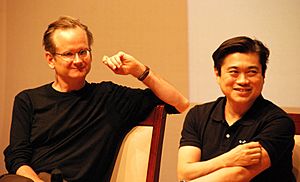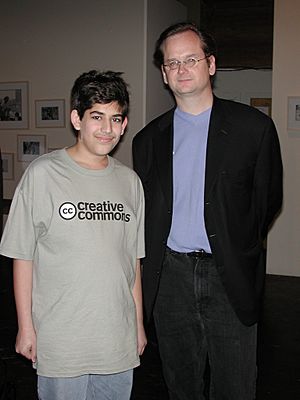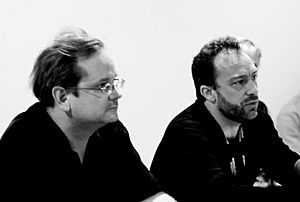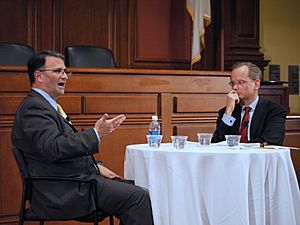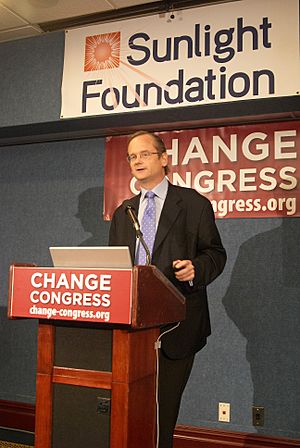Lawrence Lessig facts for kids
Quick facts for kids
Lawrence Lessig
|
|
|---|---|
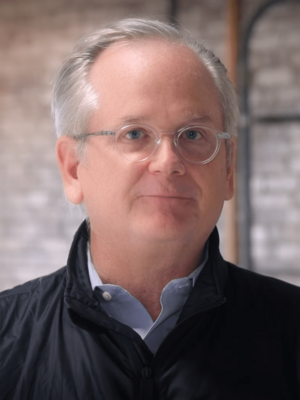
Lessig in 2024
|
|
| Born |
Lester Lawrence Lessig III
June 3, 1961 Rapid City, South Dakota, U.S.
|
| Education | University of Pennsylvania (BA, BS) Trinity College, Cambridge (MA) Yale University (JD) |
| Known for | founding Creative Commons and Equal Citizens |
| Title | Director of the Edmond J. Safra Center for Ethics at Harvard University (2009–2015) |
| Political party | Democratic |
| Movement |
|
| Spouse(s) |
Bettina Neuefeind
(m. 1999) |
| Children | 3 |
Lawrence Lessig (born June 3, 1961) is an American legal expert and political activist. He teaches law at Harvard Law School and used to lead the Edmond J. Safra Center for Ethics at Harvard University. He is famous for starting Creative Commons and Equal Citizens. Lessig also ran for president in 2016, seeking the Democratic Party's nomination, but he stopped his campaign before the main elections.
Contents
Lawrence Lessig's Journey
Lessig was born on June 3, 1961, in Rapid City, South Dakota. He grew up in Williamsport, Pennsylvania. He earned two degrees from the University of Pennsylvania in 1983. Later, he studied philosophy at Trinity College, Cambridge in England. He then returned to the United States to study law. He graduated from Yale Law School in 1989 with a law degree.
After law school, Lessig worked for important judges. He was a law clerk for Judge Richard Posner and later for Justice Antonin Scalia at the Supreme Court of the United States.
Lessig began his teaching career at the University of Chicago Law School. He helped the country of Georgia write its constitution. From 1997 to 2000, he taught at Harvard Law School. He then moved to Stanford Law School, where he started the Stanford Center for Internet and Society. In 2009, Lessig returned to Harvard. He became a professor and director of the Edmond J. Safra Center for Ethics.
What Are Lessig's Main Ideas?
Lessig believes there should be fewer legal rules on things like copyright and trademark. These are rules about who owns creative works and brand names. In 2001, he started Creative Commons. This group helps people share their creative work legally. It lets others use and build upon their creations.
Lessig is also a political activist. He wants to change how government works. He helped create a group called Mayday PAC in 2014. This group aimed to elect people to Congress who would change how political campaigns are funded. He also co-founded Rootstrikers, another group focused on political reform.
In 2015, Lessig thought about running for president. He promised to run if he could raise $1 million. He reached his goal and announced his campaign on September 6, 2015. His main goal was to change campaign finance laws. He ended his campaign in November 2015. This was because he couldn't get into the televised debates.
Lessig's Political Background
Lessig has shared that studying philosophy in England changed his views. Before that, he had more conservative political ideas. He was very active in youth political groups.
After his studies, Lessig became more politically liberal. He traveled in Eastern Europe, which made him interested in law and politics there. Even though he became more liberal, two conservative judges chose him as a law clerk. They picked him because they thought he was very smart.
Lessig is still careful about too much government control. But he does support some rules. He calls himself a "constitutionalist."
Internet and Digital Activism
"Code is Law"
In computer science, "code" means the instructions that make a computer program work. In law, "code" means written laws. In his 1999 book, Code and Other Laws of Cyberspace, Lessig explored how computer code can control people, just like laws do. He said, "Code is law." He updated this book in 2006.
Remix Culture
Lessig has supported "remix culture" for a long time. This is when people take existing creative works and change them to make something new. In his 2008 book, Remix, he said this is a good cultural practice. He believes it's different from stealing. Lessig thinks remixing is natural with technology and the internet.
He says that strict copyright laws make remixing difficult. He suggests using more flexible licenses, like Creative Commons licenses. These licenses help people share and build on creative works legally.
Free Culture
Lessig helped create the idea of "free culture." This movement supports the freedom to create, share, and build upon cultural works. He also supports free and open-source software. This is software that anyone can use, change, and share.
In 2006, Lessig gave a speech about the ethics of the Free Culture Movement. He believes that because many young people get digital information from unofficial sources, laws should change. He also argues that digital tools allow many amateur artists to create new things. Lessig is also against extending copyright terms for too long.
Net Neutrality
Lessig has always supported net neutrality. This idea means that internet providers should treat all data on the internet equally. They should not block or slow down certain websites or apps. In 2006, he spoke to the U.S. Senate about this. He said that the internet helps new ideas grow. He worried that if big companies could pay for faster service, it would hurt smaller, newer companies.
Legal Challenges
From 1999 to 2002, Lessig challenged the Sonny Bono Copyright Term Extension Act. This law extended the length of copyright. He argued that it hurt creativity and public access to works. He lost this case in the Supreme Court.
In 2013, Lessig sued Liberation Music PTY Ltd. This company had taken down one of his lectures from YouTube. The lecture used a song called "Lisztomania." Lessig won the case in 2014. Liberation Music admitted they were wrong and apologized.
Killswitch
Lessig was featured in the 2014 film Killswitch. The film also included Aaron Swartz, Tim Wu, and Edward Snowden. In the movie, Lessig talks about how Swartz and Snowden represent the internet's power to change things. The film shows the close bond between Lessig and Swartz. It also shows how Swartz inspired Lessig to become more involved in political activism.
In 2015, Killswitch was shown in Washington, D.C. Lessig spoke at the event about protecting net neutrality. Many people praised the film for its story and message.
The Electors Trust
In December 2016, Lessig helped create The Electors Trust. This group offered free legal help to members of the United States Electoral College. They wanted to help electors vote based on their conscience. This was during the 2016 presidential election.
Artificial Intelligence
Lessig supports a "right to warn" for former OpenAI employees. This would protect their right to tell the public about big risks from AI. Lessig also offered to help these whistleblowers for free.
In August 2024, Lessig co-wrote a letter supporting a California AI safety bill. This bill would require companies to check for risks in powerful AI models before releasing them. Lessig believes this bill is a good first step to manage AI risks.
Money in Politics Activism
In 2007, Lessig decided to focus on political corruption. He was inspired by a talk with Aaron Swartz. Lessig criticized the "revolving-door" problem. This is when politicians or their staff leave office to become lobbyists. This can lead to special interests having too much power.
Rootstrikers
Lessig wanted to change Congress to reduce corruption. He worked with Joe Trippi to start a project called "Change Congress." This project aimed to give voters tools to hold their representatives accountable. It also wanted to reduce the influence of money in politics.
"Change Congress" later became "Fix Congress First," and then Rootstrikers. In 2011, Rootstrikers joined forces with other groups.
Article V Convention
In 2010, Lessig started working to call a national Article V convention. He believes this convention could help fix problems in government. He supports a constitutional amendment that would limit political donations. He also supports public funding for campaigns.
New Hampshire Rebellion
The New Hampshire Rebellion is a walk to raise awareness about corruption. It started in 2014 with a 185-mile march in New Hampshire. Lessig and others walked to promote tackling "systemic corruption." They chose New Hampshire because of its important role in presidential elections. The walk also honored activist Aaron Swartz.
2016 Presidential Campaign
Lessig launched his presidential campaign on September 6, 2015. He had announced in August 2015 that he would explore running. He promised to run if he raised $1 million by Labor Day. His campaign focused on one main issue: The Citizen Equality Act. This plan aimed to reform campaign finance, stop gerrymandering, and ensure fair voting access.
Lessig initially said he would resign if the Citizen Equality Act became law. He would then let his vice president take over. Later, he changed this plan and adopted a full policy platform. He ended his campaign on November 2, 2015.
Electoral College Reform
In 2017, Lessig started a movement called Equal Votes. This movement challenges the "winner-take-all" system of the Electoral College. Lessig also helped electors in a Supreme Court case. The court decided that states could make electors follow the popular vote.
Awards and Honors
In 2002, Lessig received an award for helping advance free software. He also won the Scientific American 50 Award. This was for arguing against copyright rules that could stop new ideas online. In 2006, he was elected to the American Academy of Arts and Sciences.
In 2011, Lessig was named to the Fastcase 50. This list honors smart and brave innovators in law. He has also received honorary doctorates from universities in Sweden and Belgium. In 2014, Lessig received the Webby Lifetime Achievement award. This was for co-founding Creative Commons and supporting net neutrality.
Personal Life
Lessig is married to Bettina Neuefeind. They married in 1999 and have three children: Willem, Coffy, and Tess.
Notable Cases
Lessig has been involved in several important legal cases:
- Eldred v. Ashcroft (he represented the plaintiff, but lost)
- United States v. Microsoft (he advised the court)
- MPAA v. 2600 (he submitted a brief to support 2600)
- Chiafalo v. Washington (he represented the electors)
Filmography
Lessig has appeared in or been featured in several documentary films:
- RiP!: A Remix Manifesto (2008)
- The Internet's Own Boy: The Story of Aaron Swartz (2014)
- Killswitch (2015)
- The Swamp (2020)
- Meeting Snowden (2017), where Lessig met Edward Snowden
- Kim Dotcom: The Most Wanted Man Online (2021)
Lessig was also played by actor Christopher Lloyd in an episode of the TV show The West Wing.
Images for kids
See also
 In Spanish: Lawrence Lessig para niños
In Spanish: Lawrence Lessig para niños
 | Delilah Pierce |
 | Gordon Parks |
 | Augusta Savage |
 | Charles Ethan Porter |


